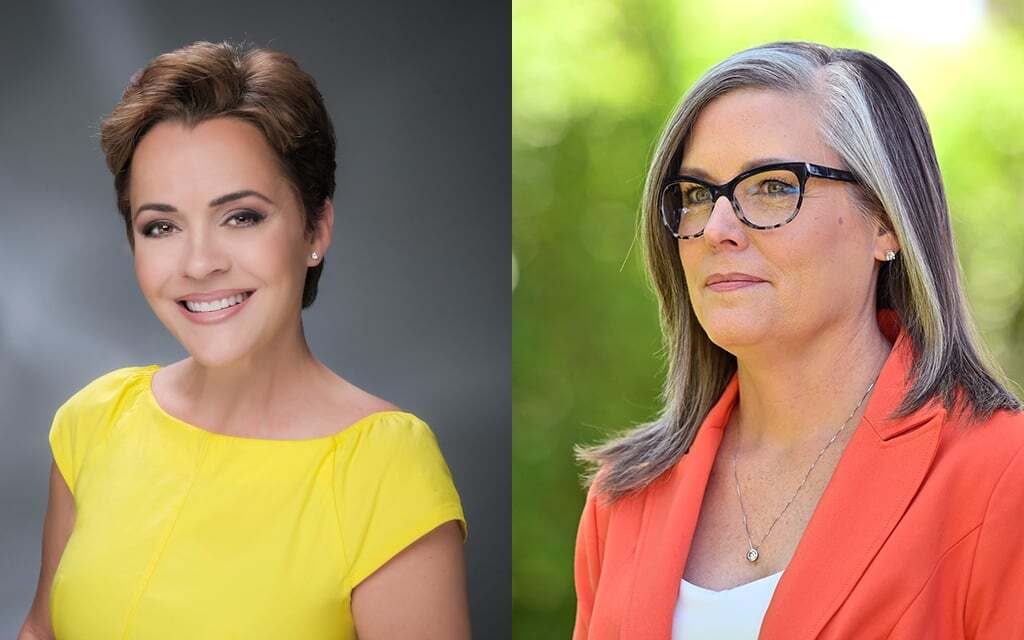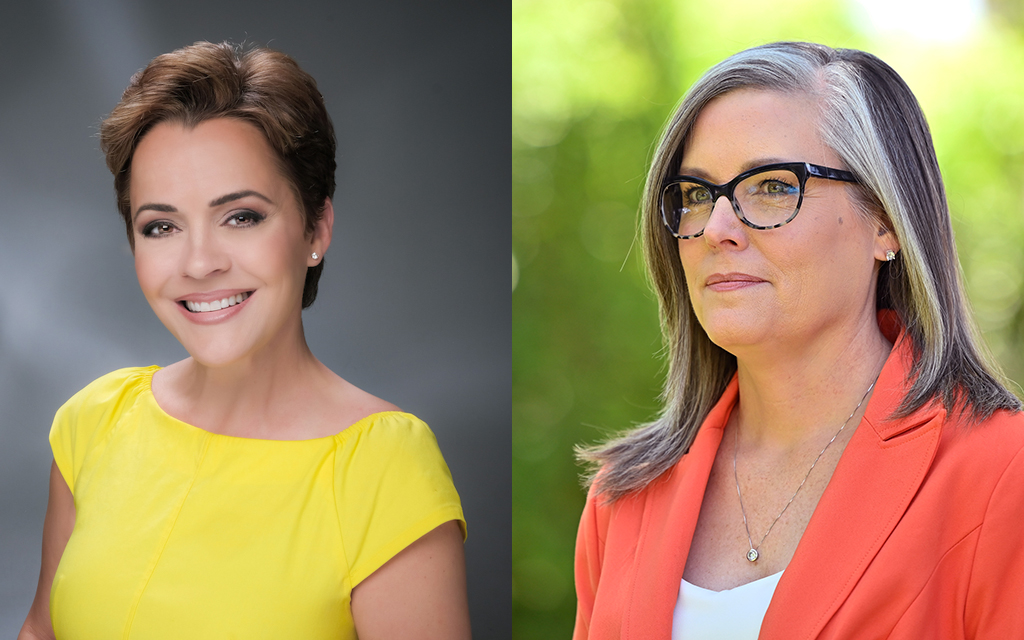
Arizona gubernatorial Republican candidate Kari Lake, left, has called Democratic opponent Katie Hobbs a coward for declining to debate her, and Hobbs has called Lake a conspiracy theorist for her denial of the 2020 election. Experts say civility is declining as political polarization is rising. (Photos courtesy of the Lake and Hobbs campaigns)
PHOENIX – From Arizona gubernatorial candidate Kari Lake calling opponent Katie Hobbs a coward to Hobbs calling Lake a conspiracy theorist, civility in political discourse doesn’t appear to be a priority this Arizona election cycle.
The polarization of American politics is a national trend that’s played out over half a century. According to the Pew Research Center, Democrats in Congress have moved more liberal in their voting since the 1970s, while Republicans have shifted significantly more conservative in their voting.
Lara Schwartz, director of the Project on Civil Discourse at American University in Washington, D.C., said the polarization is “asymmetrical,” with Republicans veering more conservative and less willing to reach across the aisle than Democrats. As an example, she points to the denial of the legitimacy of the 2020 presidential election by former President Donald Trump and other key figures in the Republican Party.
“It’s a pretty radical idea,” Schwartz said. “It’s an idea held by a lot of people in one party and by nobody in leadership in the other.”
According to PolitiFact, about 70% of Republicans do not believe Joe Biden’s presidential victory was legitimate.
Lake has denied the results of the 2020 election, as have other Republican office-seekers in Arizona, including Mark Finchem, who’s running for secretary of state, and several congressional hopefuls. Lake also refuses to say whether she would concede if defeated Nov. 8.
In addition, Lake has called Hobbs a “convicted racist” on multiple occasions.
Kim Fridkin, a Foundation professor of political science at Arizona State University, said such uncivil language could benefit a Republican more than a Democrat.
“There’s a partisan difference,” Fridkin said. “Republican voters are more tolerant of instability, so it might benefit a Republican to speak in uncivil terms. But it might not benefit a Democratic candidate because their constituents might be more repelled by that.”
Fridkin said uncivil discourse can negatively affect turnout by moderate voters. A candidate who focuses too much on attacking their opponent may not be talking about important issues, Fridkin said, which can lead undecided and independent voters to stay home on Election Day.
Debates could improve civility in a race, however, and Fridkin said the U.S. Senate race is a prime example. Republican Blake Masters has been hawkish in campaign advertisements, calling incumbent Sen. Mark Kelly a “psychopath.” However, when Masters faced Democrat Kelly and Libertarian Marc Victor in a debate earlier this month, he threw fewer, and less harsh, insults in Kelly’s direction, Fridkin said.
However, tensions did flare in a face-to-face debate between Arizona Secretary of State candidates last month. Finchem said his Democratic opponent, Adrian Fontes, “deserved the boot,” while Fontes said that Finchem tried to “overturn the Constitution.”
Hobbs’ refusal to debate Lake has raised tensions. Hobbs has declined several invitations to debate, saying Lake turned the GOP primary debate into a circus. She reiterated her opposition in an interview with Arizona PBS Tuesday, saying Lake “is only interested in a spotlight” and that she wants to have more substantive conversations about policy rather than have a potentially heated debate.
Paul Bentz, senior vice president of research and strategy at HighGround Public Affairs Consultants in Phoenix, said debates no longer are the main vehicle for information about candidates, who now have multiple ways to get in front of a camera, and that candidates who are leading their races often decline debates because a poor showing could hurt their campaigns. FiveThirtyEight, a news website that gathers and analyzes polls and data, currently projects Lake with a slim advantage over Hobbs, but well within the margin of error.
Bentz said the controversy around Hobbs’ refusal to debate took the focus off policy discussions and other information important to voters. Zingers and one-liners have replaced dialogue about policy, he said, and candidates tend to play to an audience during debates.
The civility of political debates depends on the race, Bentz said, and debates are more civil when opponents agree to ground rules and interact face to face.
“It’s like dogs,” Bentz said. “Dogs bark at each other over and over again, and then when you let them in the room together, they definitely calm down, they don’t usually attack one another.”
Fostering civil discourse among the voting population is difficult, but there is hope. Schwartz, at American University, said a debate, especially online, is binary and has a larger goal of winning rather than finding a solution.
“They take work, like almost anything hard you’ve ever tried, from hitting a baseball to singing well or playing an instrument,” Schwartz said. “We take really seriously that having these conversations is hard and that we’re trying hard to do something for which there’s not that much of a model.”
Cronkite News reporter John Brown contributed to this story.


